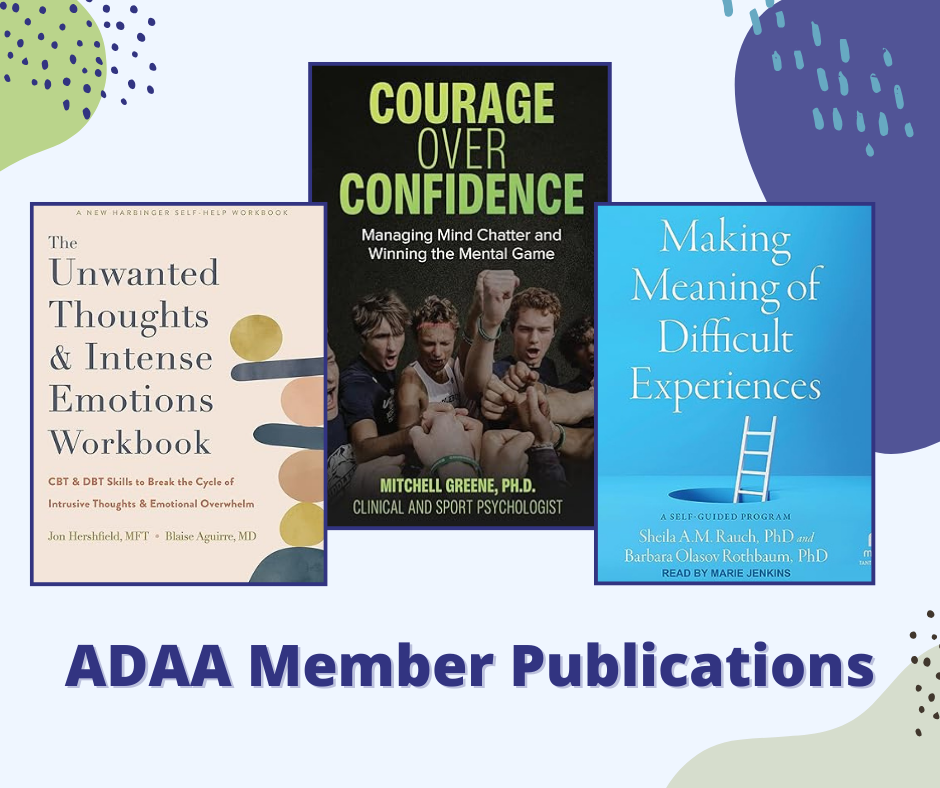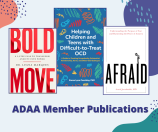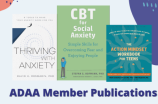New ADAA Member Books! Winter 2024
New ADAA Member Books! Winter 2024

Emotional Fitness Can Help Us with Making Meaning of Difficult Experiences
We are all aware of the importance of physical fitness and how exercise increases physiological stability, strength and stamina. In the same way that physical exercise helps our bodies, emotional exercise can help our minds. According to ADAA members Sheila Rauch, PhD, and Barbara Rothbaum, PhD, life’s challenging emotional experiences can be addressed in a similar way to how we manage our physical health through exercise and wellness practices.
Based on their work with trauma survivors and over 50 years of clinical and research experience, Drs. Rauch and Rothbaum have published a book that guides readers through emotional fitness exercises aimed at increasing psychological growth and resilience. Making Meaning of Difficult Experiences: A Self-Guided Program is a brief and easy-to-use workbook that offers evidence-based self-guided emotional fitness skills and resources.
“Difficult experiences are inevitable and avoidance is not the answer,” the clinicians told ADAA. “It may be easier in the moment but doesn’t help in the long run. In this guide, we walk readers through how to effectively deal with difficult memories and come out resilient.”
Dr. Rauch and Dr. Rothbaum - who are both associated with the Emory University School of Medicine - say they wrote this book for a general audience, particularly with the knowledge that even before the pandemic, there were not enough mental health providers to meet public need.
“In the spirit of moving our message outside of specialty mental health care and into the world so more people can learn how to thrive even through difficulty, we intend these skills to be applicable to anyone, not just trauma survivors,” they explained.
While some of the difficulties addressed in the book are trauma related and others may not have reached the severity of trauma, the psychiatry professors note that stress can significantly impact our lives and how we see ourselves and others. With the emotional exercises in this book, we all have the ability to work on our mental fitness and make meaning of our psychological wellbeing.
Order Making Meaning of Difficult Experiences here.
New Book Shows Athletes (and Others) How to Win the Mental Game So They Can Win the Game that Matters
The expression “it’s not whether you win or lose but how you play the game” makes sense in theory but to many athletes, the reality is that it’s still about winning. After all, competitions, and in particular sports competitions, are about who wins. But winning mentally is just as important as winning physically. In his newest book, Courage Over Confidence: Managing Mind Chatter and Winning the Mental Game, clinical and sport psychologist Mitchell Greene, PhD discusses how many athletes struggle to perform because their minds are full of doubt, second-guessing and negative thinking.
The ADAA member, who works with student and professional athletes, coaches, and athletic departments, says his book Courage Over Confidence provides a step-by-step plan for athletes to manage what he calls “mind chatter”. Dr Greene understands the stress and pressures that come with being an athlete and how performance anxiety, self-doubt and blame often get in the way of living up to their full potential, both on and off the field, court or ring, so to speak.
Knowing that disappointing athletic performances can lead to intense distress, heartache, frustration, and sadness in an athlete’s life, Dr. Greene hopes his book will help athletes work through those feelings rather than dismiss or ignore them.
“My book takes a different approach from most sport psychology books in that I don’t encourage people to rid themselves of negative thinking,” he told ADAA. “As much as we wish we had control over our thoughts, we don’t, especially when the stakes of performing are high. It is more effective to teach athletes to ‘make room’ for these thoughts.”
In Courage Over Confidence, the idea is to learn why mind chatter is showing up, and rather than thinking of it as a sign that there is something wrong, they can view the chatter more like an unwanted “guest” who should be managed but doesn’t necessarily need to be as much of a hindrance as they might think.
Dr. Greene says that while the audience for his book are athletes, coaches, and parents, he has received positive responses from musicians, people who have anxiety around test taking, and law enforcement officials with performance-based fears and anxiety. The strategies and recommendations that the psychologist offers in the book are just as applicable for anyone who overthinks, obsesses, feels depressed, or suffers from anxiety.
“One of the biggest takeaways from my book is that you don’t need to be confident to perform well,” he explains. “If you can learn how to more effectively manage your doubts, it’s really courage more than confidence that’s needed when it’s time to perform.”
Order Courage Over Confidence here.
Exercising Treatment Balance to Achieve Relief from Unwanted Thoughts and Intense Emotions
Relentless, intrusive and unwanted thoughts can trigger painful and intense emotions. The relationship between these thoughts and feelings is complex and people who struggle with both unwanted thoughts and intense emotions often feel treatment eludes them.
Finding the right treatment often involves a fine balance where a combination of treatments is required to address and integrate both thoughts and emotions. According to Jon Hershfield, MFT, that treatment can be a bit of a balancing exercise to target individual conditions that often compete with each other while combining treatments to help the whole person simultaneously.
“My experience working with people who have both OCD (obsessive compulsive disorder) and BPD (borderline personality disorder) as well as other conditions is that efforts to engage in effective exposure therapy are often thwarted by attempts of the other condition to take center stage,” the author and ADAA member said, “so we wrote a book to integrate the ERP and DBT (dialectical behavioral therapy) approaches, highlighting the territory they share and reconciling where the approaches may differ.”
With his co-author Blaise Aguirre, MD, an expert in DBT, they wrote The Unwanted Thoughts & Intense Emotions Workbook for anyone who struggles with unwanted thoughts and intense emotions, but especially for those with OCD and related conditions co-occurring with BPD and other similar disorders.
Working in a residential psychiatric setting, Hershfield helps people challenged by multiple conditions. He says that OCD and other conditions often collectively attack one’s sense of self and patients can feel invalidated in early attempts at treatment because those treatments tend to be approached in a rigidly manualized way.
For example: “Do this to treat that, then we’ll do that to treat this,” he explained to ADAA, “meanwhile, that has returned and this is overwhelming. I think it’s the chronic invalidation that comes from living in a world where nothing they do seems good enough that creates hopelessness and despair.”
Hershfield decided more resources and skills on how people with these conditions can find relief from multiple disorders at the same time were needed. While some “exercise” is required in the workbook, Hershfield believes that readers will benefit from the publication.
“People like myself and Dr. Aguirre who get to witness the return of hope and joy are very fortunate,” he said. “I hope readers of our book can feel how much we cherish this privilege.”
Order The Unwanted Thoughts & Intense Emotions Workbook here.
View ADAA's bookstore of our members' self-help books.
Read all of the ADAA Member Book Blogs here.
























